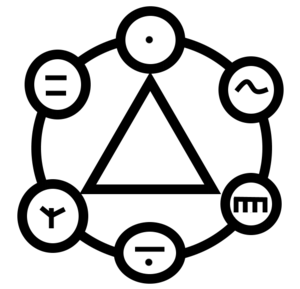Tibara
 Symbol | |
| Regions with significant populations | |
|---|---|
| Scriptures | |
| The Keystones |
Etymology
The word Tabroda may have come from proto-Madronian. Its early meaning is not entirely clear. On proto-Madronian stone tablets, pictographic writing representing Tabroda used the symbols for "rock" and "friends" or "community." Later, in proto-Ketek script writing, it appears Tabroda can be broken down into three parts: "tab" which means "follower," "ro" which can mean "unseen," "dark," or "shadow" and "da" which means life. Roughly translated it means "unseen life follower" or "shadow life follower," but it is generally taken to mean "spirit follower."
Beliefs
The Spirits and the Soul
Tabrodists believe in six distinct spirits: the Spirit of Stone (proto-Ketek: roda tak or Tak), the Spirit of Air (proto-Ketek: roda ha or Ha), the Spirit of Water (proto-Ketek: roda mon or Mon), the Spirit of Sand (proto-Ketek: roda ram or Ram), the Spirit of Plants (proto-Ketek: roda act or act), the Spirit of Creatures (proto-Ketek: roda hapanda or Hapanda). They believe each of these spirits take up residence in a human being and combine to form The Soul (roda tabdhir or Tabdhir). And thus, human beings are all connected to each of the spirits of the world. These six spirits are said to be present in everything and everyone, and they are regarded as omnipotent, omnipresent, omniscient, and immortal. Their presence is in organic matter, inorganic matter, natural disasters, wind, rain, fire, and sunshine. In other words, nature itself is often regarded to be inhabited by the divine.
Humans themselves being occupied by all six spirits in the combined Soul are regarded as divine and the caretakers of the world around them. While it is clear humans are not omniscient, omnipresent, omnipotent, and immortal, it is held that the reason for this is due to the spirits within them, their Soul, having conflict. The ultimate spiritual aim is to bring these spirits into balance with one another, so that a human might be able to live a full, divine life with all the associated benefits of the divine.
Cosmology and Afterlife
The Spirit of Stone is given special prominence in Tabroda due to the belief that Stone was the first spirit to have form and to help give rise to all the other spirits.
Morality
Practice
Communal worship
Spiritual Leadership and Organization
- Speaker of the Soul (proto-Ketek: musal tabdhir)
- Speaker of the Stone (proto-Ketek: musal takh)
- Speaker of the Air (proto-Ketek: musal waha)
- Speaker of the Water (proto-Ketek: musal monda)
- Speaker of the Sand (proto-Ketek: musal ram)
- Speaker of the Plants (proto-Ketek: musal actal)
- Speaker of the Creatures (proto-Ketek: musal hayanda)
- Caretakers (proto-Ketek: tabalbu)
Prayer
Rituals
Festivals
Dance
Healing and Divination
Sacred Texts
The Keystones
Holy Sites
Natural Wonders
Megalithic Structures
- Tree of Stones
Denominations
History
450 BCE - Tabroda begins to form as a religion made up of already present traditions and nature worship rituals.
400 CE - Tensions were high as the people of Amir tried to decide where their priorities were. Tabrodists, in particular, were adamant about a larger focus on nature. Others hoped the Soluk empire would return to its former glory. And others still thought they should focus on a new identity. This tension never ended up fully resolved, even when the city of Kridshar stood victorious and proclaimed the first emperor of Amir, Iskus I.
830-880 - This would lead to a civil war as some Amirans sought to get back to their cultural, nature-worshipping roots while others had more economic interests in mind. The fighting lasted for fifty years, ravaging the local economy and putting developmental progress on hold. Eventually, the wealthiest of the merchant classes united near the end of the culture war and began to put down revolutionary Tabrodists. The merchant classes divide the fallen Amir empire into three separate empires known as the Jade Empire, the Ivory Empire, and the Salt Empire.
950 - The Tjasult University established by merchant prince, Sultjir Tjasult, born of family from both empires who had a special interest in Tabroda and understanding the mysteries of the natural world.
